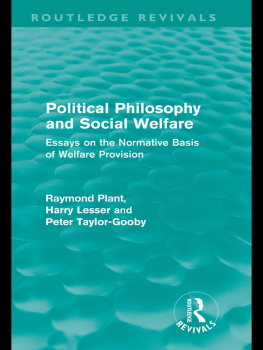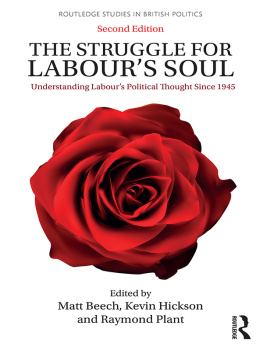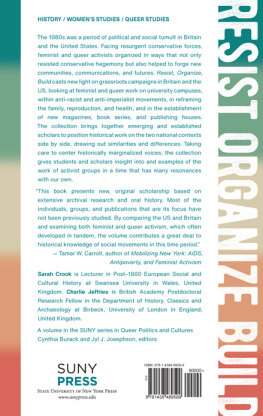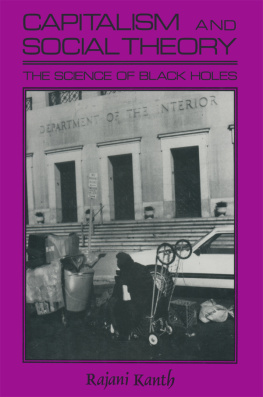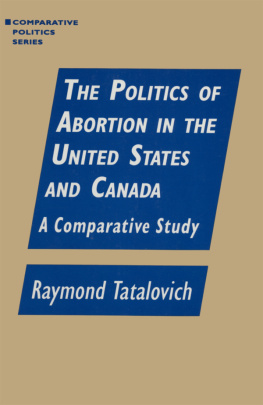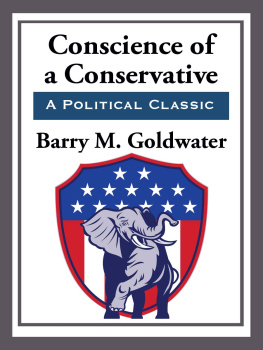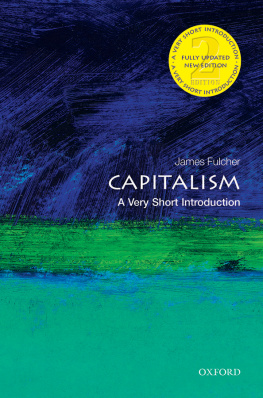ROUTLEDGE LIBRARY EDITIONS: SOCIAL THEORY
Volume 15
CONSERVATIVE CAPITALISM IN BRITAIN AND THE UNITED STATES
CONSERVATIVE CAPITALISM IN BRITAIN AND THE UNITED STATES
A Critical Appraisal
KENNETH HOOVER AND RAYMOND PLANT
First published in 1989
This edition first published in 2015
by Routledge
2 Park Square, Milton Park, Abingdon, Oxon, OX14 4RN
and by Routledge
711 Third Avenue, New York, NY 10017
Routledge is an imprint of the Taylor & Francis Group, an informa business
1989 Kenneth Hoover and Raymond Plant
All rights reserved. No part of this book may be reprinted or reproduced or utilised in any form or by any electronic, mechanical, or other means, now known or hereafter invented, including photocopying and recording, or in any information storage or retrieval system, without permission in writing from the publishers.
Trademark notice: Product or corporate names may be trademarks or registered trademarks, and are used only for identification and explanation without intent to infringe.
British Library Cataloguing in Publication Data
A catalogue record for this book is available from the British Library
ISBN: 978-0-415-72731-0 (Set)
eISBN: 978-1-315-76997-4 (Set)
ISBN: 978-1-138-78304-1 (Volume 15)
eISBN: 978-1-315-76367-5 (Volume 15)
Publishers Note
The publisher has gone to great lengths to ensure the quality of this reprint but points out that some imperfections in the original copies may be apparent.
Disclaimer
The publisher has made every effort to trace copyright holders and would welcome correspondence from those they have been unable to trace.
CONSERVATIVE CAPITALISM IN BRITAIN AND THE UNITED STATES
A Critical Appraisal
KENNETH HOOVER
and
RAYMOND PLANT
First published in 1989 by
Routledge
11 New Fetter Lane, London EC4P 4EE
29 West 35th Street, New York NY 10001
1989 Kenneth Hoover and Raymond Plant
Set in Baskerville by Input Typesetting Ltd, London
Printed in Great Britain by the Guernsey Press, Guernsey
All rights reserved. No part of this book may be reprinted or reproduced or utilized in any form or by any electronic, mechanical, or other means, now known or hereafter invented, including photocopying and recording, or in any information storage or retrieval system, without permission in writing from the publishers.
British Library Cataloguing in Publication Data
Hoover, Kenneth
Conservative capitalism in Britain and the United States: a critical appraisal.
1. Political ideologies: Conservatism
I. Title II. Plant, Raymond
320.52
Library of Congress Cataloging in Publication Data
Hoover, Kenneth R., 1940
Conservative capitalism in Britain and the United States: a critical appraisal/Kenneth Hoover and Raymond Plant.
p. cm.
Includes index.
ISBN 0415015839. ISBN 0415015847 (pbk.)
1. ConservatismGreat Britain. 2. ConservatismUnited States. 3. Great BritainEconomic policy1945. 4. United StatesEconomic policy1981. 5. CapitalismGreat Britain. 6. CapitalismUnited States. I. Plant, Raymond. II. Title.
JA84.G7H66 1988
320.520941dc19
8812200
CIP
Both in Britain and the United States the explosion of a more aggressive, forceful, and successful conservative politics during the last decade was largely unpredicted: the rhetoric of free enterprise, individualism, and antipathy to Big Government had been an ideological staple of politics in both countries for generations, but the startling success of such themes came as a surprise even to the followers of Ronald Reagan and Margaret Thatcher.
How are we to understand this success?
And in what appear to be the waning days of the strong form of such themes in the Reagan administration how are we to consider political options for the future?
Kenneth Hoover and Raymond Plant are first and foremost interested in the problem of ideology; they leave to other authors and other occasions the detailed exploration of economics, political organization, elections, etc. This focus is significant: an important lesson of the decade is that ideology on its own plays a powerful role in politics an idea which had far less currency only a few years ago, especially in the United States. Just how powerful a role it will continue to play may well be the most significant question even, in the nuclear age, a life and death question of the remainder of the twentieth century. A dissection of ideology also opens the way for a discussion of opportunities and challenges facing those who do not share the premises of conservative capitalism.
Hoover and Plant avowedly seek to provide political guidance to the left, but their book is a well-informed essay which will also stimulate thought among a wide range of others who do not so identify themselves. They begin by making a sharp distinction between individualist and traditional strains in conservative thought. The cleavage, broadly speaking, is between those who urge unadulterated laissez-faire policies and those who believe the state must play a role in helping the poor, in maintaining social cohesion, and in guiding moral and even personal behaviour. They continue the analysis by detailing the attack on liberal-capitalist institutions and policies that form the intellectual basis for the Reagan and Thatcher governments. The authors make clear precisely where the new departures originated.
The ideological basis for this cleavage (as distinct from its practical and political implications) is much better understood in Britain than in the United States. American conservatives also come in different varieties, but the rhetoric of most is strongly libertarian in tone. True enough, a few intellectuals and journalists Russell Kirk and George Will, for instance stress the role of tradition and of community; and the Moral Majority emphasizes an activist government to preserve moral values in connection with drugs, sex, abortion, school prayer, etc. But in the United States, the conservative


